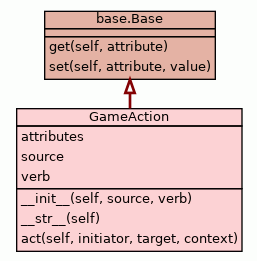Every GameActor has, at any given time, a list of possible actions
from which they can choose. Some of these possibilities may be intrinsic
in the actor, while others are made possible by GameObjects (e.g. a
weapon), by other actors (e.g. interaction) or a GameContext (e.g.
searching a room).
A GameAction is an action possibility that has been associated with a
GameActor. It has attributes that describe and quantify its effects.
When the GameAction's act() method is called, it computes
probabilities and strengths (based on attributes of the actor and
enabling artifact) and calls the target's accept_action()
handler, which will determine and return the results.
|
|
|
|
|
|
|
|
act(self,
initiator,
target,
context)
Initiate an action against a target |
source code
|
|
|
|
__get_list(self,
name,
size)
read specified attribute, lex its (comma-separated) values into a
list |
source code
|
|
|
|
__accuracy(self,
verb,
base,
initiator)
helper to compute accuracy of this attack, based on the supplied base
ACCURACY plus any initiator ACCURACY(.subtype) bonus(es). |
source code
|
|
|
|
__damage(self,
verb,
base,
initiator)
helper to compute the damage of this attack, based on the supplied
base DAMAGE plus any initiator DAMAGE(.subtype) bonus(es). |
source code
|
|
|
|
__power(self,
verb,
base,
initiator)
helper to compute the power of this action, based on the supplied
base POWER plus any initiator POWER.verb/POWER.verb.subtype bonuses |
source code
|
|
|
|
__stacks(self,
verb,
base,
initiator)
helper to compute the stacks of this action, based on the supplied
base STACKS plus any initiator STACKS.verb/STACKS.verb.subtype
bonuses |
source code
|
|
|
Inherited from base.Base:
get,
set
Inherited from object:
__delattr__,
__format__,
__getattribute__,
__hash__,
__new__,
__reduce__,
__reduce_ex__,
__repr__,
__setattr__,
__sizeof__,
__subclasshook__
|

